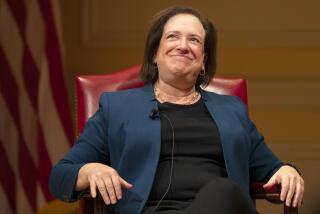Supreme Court weighs the right to a refund for people who paid fines before they were freed
- Share via
Reporting from Washington — A UCLA law professor urged the Supreme Court on Monday to rule that the Constitution requires the government to refund fines and fees paid by people whose criminal convictions are reversed.
People who are freed are “entitled to get their money back,” Professor Stuart Banner told the court. It is, he said, a matter of common sense and long legal tradition. In his legal brief, he called it a “proposition almost too obvious to need stating.”
But it has not always been a winner in state courts.
Trump’s victory assures a conservative majority on the Supreme Court. »
Banner and UCLA’s Supreme Court Clinic appealed on behalf of Shannon Nelson, a Colorado woman who paid $702 in fees and restitution after she was convicted of abusing her children. But when her conviction was reversed and she was acquitted in a retrial, Colorado officials refused to refund the money.
The UCLA clinic raised the issue in an appeal last year and said Colorado was the only state to enforce such a rigid rule. The justices voted to hear the case of Nelson vs. Colorado and to rule on the Constitution’s requirement for due process of law and fair treatment of people whose convictions are reversed.
During Monday’s argument, most of the justices voiced skepticism over Colorado’s claim that the state may keep money taken from criminal defendants who have been exonerated.
“Whose money is it?,” Justice Elena Kagan asked Colorado Solicitor General Frederick Yarger.
For the 4th time, the Electoral College picks the loser of the popular vote. »
“This is the state’s money,” he said. “It is property obtained pursuant to a conviction.”
But that conviction was overturned, she said. “So why is this state’s money?”
The other justices sounded surprised at the state lawyer’s unyielding claim. Chief Justice John G. Roberts Jr. wondered if the state could impose a $10,000 fine on every person who was convicted of a crime and keep the money if the convictions were later reversed.
Yes, Yarger said.
Justice Stephen G. Breyer, smiling in disbelief, said “you have a tough side of this argument. It doesn’t seem very fair.” It would mean a corporation that was fined several million dollars for an offense would not be able to get its money back even if it won an appeal reversing the conviction. “Now there’s something wrong with that,” Breyer said.
The Colorado state judges said exonerated defendants could sue the state to obtain a refund of the fines and fees, but they would have to prove their innocence. None of the justices showed interest in that option.
While the eight justices have often sounded evenly split in recent months, they sounded in agreement on Monday. The court will hand down an opinion in the case in a month or two.
The case highlights the growing trend of law schools and their student clinics of finding and appealing issues to the high court that involve large legal principles but small amounts of money.
Last year, the UCLA clinic won a 1st Amendment ruling on a behalf of a New Jersey police detective who was demoted after he was seen a carrying a campaign sign for a political rival of the police chief.
Stanford’s Supreme Court clinic, which has led the way, has worked on more than two dozen criminal cases before the high court in the past decade. It has also won several landmark victories, including a 2014 ruling in Riley vs. California in which the justices ruled the police may not seize and examine the contents of smartphones without obtaining a search warrant.
In these cases, law students do the legal research and help with drafting the briefs.
On Wednesday, Stanford law professor Jeff Fisher will argue a major special education case on behalf of a Colorado couple and their autistic child. They say the federal civil rights law for children with disabilities requires schools to offer more than a minimally adequate education program.
On Twitter: DavidGSavage
ALSO:
Can Trump put another Justice Scalia on the Supreme Court?
UPDATES:
12:30 p.m.: This article was updated with additional details of the arguments in the case.
8:55 a.m.: This article was updated with the end of oral arguments.
This article was originally published at 7:25 a.m.
More to Read
Get the L.A. Times Politics newsletter
Deeply reported insights into legislation, politics and policy from Sacramento, Washington and beyond. In your inbox twice per week.
You may occasionally receive promotional content from the Los Angeles Times.











